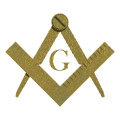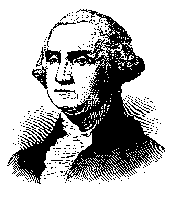|
Admission to membership in Freemasonry has always been limited to men, but
there are several appendant organizations for the Ladies and for the boys and
girls. There are also concordant organizations to which only Masons can
apply for membership, including the Scottish Rite, the Royal Arch, and the
Shriners, to name the largest and best know. These are a part of the
Masonic Family.
Freemasonry has no restrictions based on race, creed, ethnic origin or social
status.
As stated before, no one will openly invite a man to become a mason.
You must ASK ONE TO BECOME ONE
MEMBERSHIP REQUIREMENTS
The absolute requirements for becoming a Mason are:
Have belief in a Supreme Being (No particular religion or faith is required
or excluded. All are welcome.)
Be a man, at least 21 years old. (18 in some jurisdictions)
Be of good moral character
Be of good reputation
Be loyal to your country
Have a sincere determination to conduct yourself in a
manner that will earn the respect and trust of others
You should be coming to Masonry "of your own free will and accord",
to learn to improve yourself and to enjoy the company of other good people, not
because someone keeps pestering you to join or because you think it will help
you "get ahead" in business.
You should be someone who does, or want to learn to, enjoy the company of
other men from all different social classes, faiths, backgrounds, races,
countries, etc. Masonry is universal in its ideals.
Dedicated to providing for your own family. If
you are a family man, Masonry considers that your family obligations come FIRST,
so you must be sure that:
- You have the time to participate (usually two or three evenings/month at
first for meetings and instruction, and then at least one evening
per month for meetings from then on -- often more if you get involved in
lodge activities.)
- You can afford the initiation fees and the annual dues without hardship to
yourself or your family.
Possess a desire to help others through community service
and universal benevolence
Let's expand what some of the concepts means:
A belief in a Supreme Being. Every applicant must profess such a
belief but Freemasonry does not define, or impose, a definition of a Supreme
Being. Each individual applicant must define that entity for himself.
Atheists and Agnostics cannot, therefore, become Freemasons. This belief
is absolute and admits of no exceptions. Of course individuals might lie in this
respect in order to gain admission and there is little that Freemasons could do
to identify such men. All is taken on the honor of the individual concerned.
In fact everything that a Freemason does in his private and public life must be
honorable and Freemasonry encourages all members to behave in an upright and
moral manner. Members are encouraged to support their individual faith by
attendance at their Mosque, Church, Chapel etc, but it is not a requirement.
A Member's Obligation. Each and every applicant must be able to fulfill
his obligations (financial, moral, and in terms of his time) to his family, his
employment and his faith before he makes any commitment to Freemasonry.
Masonic 'Obligation'. Applicants must take a vow, or oath, on a
holy book on his admission to Freemasonry. Such an oath, or obligation, is
necessary in order to add sanctity to what is a serious undertaking and can be
compared to; 'swearing the whole truth and nothing but the truth' in a court of
law. Such oaths were common in many aspects of life 400 years ago when
Freemasonry began and today's Freemasonry continues that practice. As all men
who profess a belief in a Supreme Being are eligible for membership, the
required oath may be taken on the Holy Book of each individual's faith. In
multi-cultural societies it is common to find Holy Books in Lodges, other than
the Bible, on which candidates take their obligation.
Moral and Upright Men. This means that a man who has been convicted, in a
court of law, of a serious criminal offence cannot become a Freemason. Anyone
who is a Freemason who is so convicted is subject to Masonic discipline and will
be expelled from the Craft.
Membership. No man is permitted to use his membership to advance his own
political, religious or business aims. For this reason Lodges do not allow
members to discuss political, religious or business matters. Anyone who persists
in doing so is in danger of expulsion. There is no doubt that one of the
attractions of Masonic Lodges is the ability of all faiths, creeds and cultures
to mix freely knowing that no one is interested in the individual's social
position, faith, or politics. This ability to meet with others, of various
backgrounds has been one of the mainstays of Freemasonry for centuries. This,
unique situation has been described as being: 'the ideal escape from the rat
race'.
HOW TO GET STARTED
Follow these steps to become a member
To join, all you have to do is ask a Mason. Remember
Masons do not solicit for members. You'll need to express your personal
interest in joining the Fraternity.
- Preferably someone you know or at least who lives or works nearby, or...
- If you think that don't know any Masons in your area, you could post to
the newsgroup alt.freemasonry and ask that anyone who lives in your general
area reply to you, or...
- You can probably find nearby lodges listed in your phonebook. (White-pages
listings for lodges may be under "Masons", "Freemasons",
or "Masonic Temple", and the Grand Lodge would probably be under
"Grand Lodge of Masons"), or...
- Find your state's Grand Lodge in the Internet. Call or email them and ask
to speak to someone in the office of the Grand Secretary. Click here
for a List
of Grand Lodges Webpages. You must be connected to the Internet
- Once you have found someone you know who is a member
of the Fraternity, TELL HIM YOU WANT TO JOIN.
- The person will give you a petition to fill out.
You will get a "Petition for Membership" that you will have to fill
out completely and have members of the Lodge sign it recommending you for
membership. Once filled, return it to the person who gave you the petition
or go to the Lodge and give it to any member or the Secretary along with
your initial fees.
Your Petition for membership will be read at the next
Stated Meeting and afterwards an Investigated Committee will be appointed.
Your character will be investigated by the Investigating Committee. This is
done by three members who will meet with you, your family if so desire and
answer any questions
Your petition will be presented and voted upon by secret ballot by all lodge
member. All present members must accept you that is it must be
unanimous.
- If accepted, you will be notified by the Lodge's Secretary to appear to
receive the first of three Degrees of Masonry. He is the only one
authorize to do so.
- If not accepted, the Lodge Secretary will notify you. and your initial
deposit will be returned to you
If accepted you will receive information on when you will begin your degrees
and your journey in Masonry begins
FEES AND DUES
The
fee for the three degrees of Masonry within this Lodge shall be DM 400.00 (EUR
206.00), or equivalent in U.S. Dollars, and shall further be defined as follows:
a)
Entered Apprentice degree DM 200.00 (EUR 103.00); Fellowcraft degree DM
100.00 (EUR 51.50); Master Mason degree DM 100 (EUR 51.50).
b)
The amount of DM 200.00 (EUR 103.00) shall be payable in advance with the
petition, for consideration by the Lodge
c)
The amount of DM 200 (EUR 103.00) shall be payable, if elected, prior to
receiving the Entered Apprentice degree
d)
If rejected by action of the Lodge, as stated before, all fees paid by
the Petitioner shall be immediately refunded
The fee for
affiliation shall be DM 25 (EUR 13.00) for those who are already Master Masons
payable in advance with the petition for consideration by the Lodge.
If rejected by action of the Lodge the DM 25.00 paid by the petitioner
will be returned
The
annual dues is payable by each voting member (excepting honorary members) on or
before the first day of January of each year, shall be $50.00
HOW DO I QUIT
Although different Grand
Lodge jurisdictions will have their own definitions and requirement, all entitle
their members to voluntarily withdraw if they so desire. There is no coercion or
penalty; only, as in most things Masonic, a proper form.
Demits are usually issued in these two circumstances:
- If a brother in good standing finds himself, for whatever personal reason,
unable or unwilling to maintain his association with Freemasonry, he may
voluntarily withdraw from Freemasonry by requesting a demit, which he is
entitled to receive
- If a brother in good standing wants to affiliate to another lodge and withdrawal
his membership from his current lodge. Usually a brother does this due
to the financial strain it can impose by paying "annual dues" to
different lodges. But also do not be surprise, you will find many
brothers that are members in multiple lodges at the same time. This is
their choice as it should be yours
If a member is free of all charges (fiscal and conduct) and is in possession
of a current dues card at the time of his demit or death, he shall be known as
"a member in good standing at that time". However, a member in good
standing at the time of demit is not a "member" nor in "good
standing" thereafter, as he has voluntarily withdrawn himself from the
rights and privileges of Freemasonry.
A demitted member may still, with some restrictions in some jurisdictions,
visit Lodges; but most importantly he will also find it easier if he wishes to
affiliate with a Lodge in the future.
Just as important is the potential bearing of his Masonic status on his
family. Membership in appendant organizations such as the Eastern Star for
women, Job's Daughters for girls, and DeMoley for boys, requires that a brother,
husband, uncle, father or grandfather be, or have been, a Freemason. A member
who is suspended does a potential disservice to his children or children's
children.
To obtain a Demit, you must officially inform your lodge's secretary in
writing of such request or if affiliating, the new lodge's secretary will
request it for you.
Taking a demit is preferable to being suspended.
Suspension deprives a member of all his Masonic rights and privileges, either
for a definite or indefinite time. A member can be suspended by his Lodge for
non-payment of dues. A Grand Lodge Trial Commission can also suspend or expel a
member for unmasonic conduct. A member, once expelled or suspended, is no longer
considered a Freemason. He has no claims on Freemasonry and Freemasonry
has no claims on him.
back to top
| 

![]()